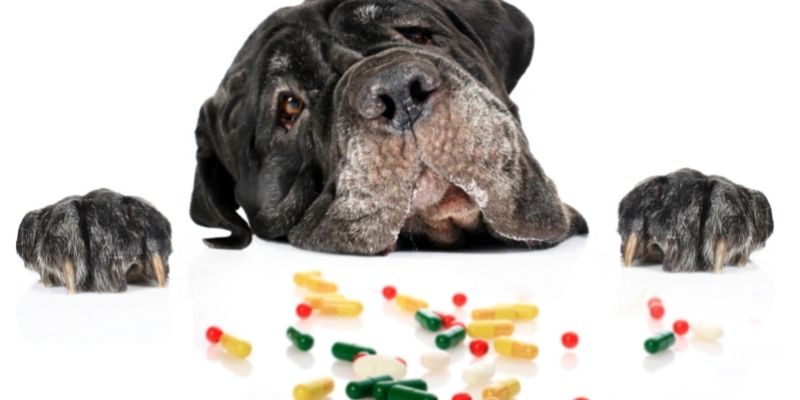While antibiotics may cause various adverse effects in dogs, increasing thirst does not appear to be one of them. However, some puppies may still feel the need to drink more while on medicine for various reasons. I’ll go over the majority of them below.
Do you have a specific question about antibiotics affecting dog’s thirst? Then use the table of contents below to jump to the most relevant section. And you can always go back by clicking on the black arrow in the right bottom corner of the page. Also, please note that some of the links in this article may be affiliate links. For more details, check the Disclosure section at the bottom of the page.
Here's what we'll cover:
What does ot mean to drink a lot?
But first, let’s define what it means to drink a lot of water when talking about your pet.
If you’re not sure what’s usual for your dog, try these calculations to get a ballpark figure.
Normal water intake: (70 x pounds your dog weighs) x 0.75
Over 24 hours, normal urine output is 10 to 20 ml per pound dog weight.
A veterinarian should be consulted if there is a noteworthy change in your dog’s habits.
Common causes of excessive thirst in dogs
Physiological. Essentially a typical reaction to increased drinking; this shows that your dog’s issue may be behavioral.
Pathological. Caused by a metabolic condition such as renal failure or hormone imbalance; this can be further subdivided into water diuresis (dilute urine with a low specific gravity) and solute diuresis (dilute urine with a high specific gravity) (urine with a high specific gravity)
Pharmacological. Due to increased salt consumption or drugs that enhance urine output, such as diuretics or corticosteroids.
As you can see, medication (including antibiotics) can cause dogs to become thirsty. But let’s try to be more specific and figure out why this might happen. To begin with, antibiotics might leave an unpleasant taste in your mouth. And your dog may be trying to get rid of it by drinking excessively.
Another cause could be that his medication made him feel nauseous. When their stomachs are disturbed, some dogs drink more.
In addition, hounds, like people, can have dry mouths when taking some drugs. It could also be instinctive, understanding that he required extra fluids to assist himself recover and restoring any lost fluids.
Do I need treatment for increased thirst?
Treatment will almost certainly be provided on an outpatient basis. Unless the thirst is caused by a significant health condition (such as renal or hepatic failure, which can lead to increased water consumption or urine), no treatment or behavior modification is required.
Your veterinarian may advise you to limit your dog’s water intake while also ensuring that he is well hydrated. Hydration levels should be checked throughout and after therapy because dehydration can lead to significant medical problems. Electrolytes may be provided if the dog is dehydrated.
Thanks for the blog graphics: Canva.com

Thanks for the blog graphics: Canva.com
Doghint.com is a participant of several affiliate programs. The list includes (but not limited to) the following: VigLink, Refersion, ShareASale, and Amazon Services LLC Associates Program, an affiliate advertising program designed to provide a mean for us to earn fees by linking to Amazon.com and affiliated sites. Doghint.com does not intend to provide veterinary advice. All published articles are meant for informational purposes only and not substitute the professional veterinary consultation.


